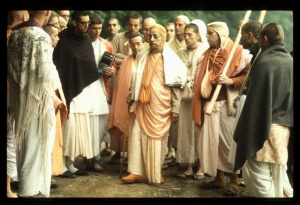SB 3.12.29: Difference between revisions
m (1 revision(s)) |
(Vanibot #0054 edit - transform synonyms into clickable links, which search similar occurrences) |
||
| (One intermediate revision by one other user not shown) | |||
| Line 1: | Line 1: | ||
{{info | {{info | ||
|speaker=Maitreya | |speaker=Maitreya Ṛṣi | ||
|listener=Vidura | |listener=Vidura | ||
}} | }} | ||
[[Category:Srimad-Bhagavatam - Canto 03 Chapter 12]] | |||
[[Category:Bhagavatam Verses Spoken by Maitreya Rsi - Vanisource|031229]] | |||
<div style="float:left">'''[[Srimad-Bhagavatam]] - [[SB 3|Third Canto]] - [[SB 3.12: Creation of the Kumaras and Others|Chapter 12: Creation of the Kumāras and Others]]'''</div> | |||
<div style="float:right">[[File:Go-previous.png|link=SB 3.12.28]] '''[[SB 3.12.28]] - [[SB 3.12.30]]''' [[File:Go-next.png|link=SB 3.12.30]]</div> | |||
{{RandomImage}} | |||
==== TEXT 29 ==== | ==== TEXT 29 ==== | ||
<div | <div class="verse"> | ||
tam adharme kṛta-matiṁ | :tam adharme kṛta-matiṁ | ||
vilokya pitaraṁ sutāḥ | :vilokya pitaraṁ sutāḥ | ||
marīci-mukhyā munayo | :marīci-mukhyā munayo | ||
viśrambhāt pratyabodhayan | :viśrambhāt pratyabodhayan | ||
</div> | </div> | ||
| Line 16: | Line 22: | ||
==== SYNONYMS ==== | ==== SYNONYMS ==== | ||
<div | <div class="synonyms"> | ||
''[//vanipedia.org/wiki/Special:VaniSearch?s=tam&tab=syno_o&ds=1 tam]'' — unto him; ''[//vanipedia.org/wiki/Special:VaniSearch?s=adharme&tab=syno_o&ds=1 adharme]'' — in the matter of immortality; ''[//vanipedia.org/wiki/Special:VaniSearch?s=kṛta&tab=syno_o&ds=1 kṛta]-[//vanipedia.org/wiki/Special:VaniSearch?s=matim&tab=syno_o&ds=1 matim]'' — the mind being so given; ''[//vanipedia.org/wiki/Special:VaniSearch?s=vilokya&tab=syno_o&ds=1 vilokya]'' — seeing thus; ''[//vanipedia.org/wiki/Special:VaniSearch?s=pitaram&tab=syno_o&ds=1 pitaram]'' — unto the father; ''[//vanipedia.org/wiki/Special:VaniSearch?s=sutāḥ&tab=syno_o&ds=1 sutāḥ]'' — sons; ''[//vanipedia.org/wiki/Special:VaniSearch?s=marīci&tab=syno_o&ds=1 marīci]-[//vanipedia.org/wiki/Special:VaniSearch?s=mukhyāḥ&tab=syno_o&ds=1 mukhyāḥ]'' — headed by Marīci; ''[//vanipedia.org/wiki/Special:VaniSearch?s=munayaḥ&tab=syno_o&ds=1 munayaḥ]'' — sages; ''[//vanipedia.org/wiki/Special:VaniSearch?s=viśrambhāt&tab=syno_o&ds=1 viśrambhāt]'' — with due respect; ''[//vanipedia.org/wiki/Special:VaniSearch?s=pratyabodhayan&tab=syno_o&ds=1 pratyabodhayan]'' — submitted as follows. | |||
</div> | </div> | ||
| Line 23: | Line 29: | ||
==== TRANSLATION ==== | ==== TRANSLATION ==== | ||
<div | <div class="translation"> | ||
Thus, finding their father so deluded in an act of immorality, the sages headed by Marīci, all sons of Brahmā, spoke as follows with great respect. | Thus, finding their father so deluded in an act of immorality, the sages headed by Marīci, all sons of Brahmā, spoke as follows with great respect. | ||
</div> | </div> | ||
| Line 30: | Line 36: | ||
==== PURPORT ==== | ==== PURPORT ==== | ||
<div | <div class="purport"> | ||
The sages like Marīci were not in the wrong in submitting their protests against the acts of their great father. They knew very well that even though their father committed a mistake, there must have been some great purpose behind the show, otherwise such a great personality could not have committed such a mistake. It might be that Brahmā wanted to warn his subordinates about human frailties in their dealings with women. This is always very dangerous for persons who are on the path of self-realization. Therefore, great personalities like Brahmā, even when in the wrong, should not be neglected, nor could the great sages headed by Marīci show any disrespect because of his extraordinary behavior. | The sages like Marīci were not in the wrong in submitting their protests against the acts of their great father. They knew very well that even though their father committed a mistake, there must have been some great purpose behind the show, otherwise such a great personality could not have committed such a mistake. It might be that Brahmā wanted to warn his subordinates about human frailties in their dealings with women. This is always very dangerous for persons who are on the path of self-realization. Therefore, great personalities like Brahmā, even when in the wrong, should not be neglected, nor could the great sages headed by Marīci show any disrespect because of his extraordinary behavior. | ||
</div> | </div> | ||
__NOTOC__ | |||
<div style="float:right; clear:both;">[[File:Go-previous.png|link=SB 3.12.28]] '''[[SB 3.12.28]] - [[SB 3.12.30]]''' [[File:Go-next.png|link=SB 3.12.30]]</div> | |||
__NOTOC__ | |||
__NOEDITSECTION__ | |||
Latest revision as of 21:27, 17 February 2024

A.C. Bhaktivedanta Swami Prabhupada
TEXT 29
- tam adharme kṛta-matiṁ
- vilokya pitaraṁ sutāḥ
- marīci-mukhyā munayo
- viśrambhāt pratyabodhayan
SYNONYMS
tam — unto him; adharme — in the matter of immortality; kṛta-matim — the mind being so given; vilokya — seeing thus; pitaram — unto the father; sutāḥ — sons; marīci-mukhyāḥ — headed by Marīci; munayaḥ — sages; viśrambhāt — with due respect; pratyabodhayan — submitted as follows.
TRANSLATION
Thus, finding their father so deluded in an act of immorality, the sages headed by Marīci, all sons of Brahmā, spoke as follows with great respect.
PURPORT
The sages like Marīci were not in the wrong in submitting their protests against the acts of their great father. They knew very well that even though their father committed a mistake, there must have been some great purpose behind the show, otherwise such a great personality could not have committed such a mistake. It might be that Brahmā wanted to warn his subordinates about human frailties in their dealings with women. This is always very dangerous for persons who are on the path of self-realization. Therefore, great personalities like Brahmā, even when in the wrong, should not be neglected, nor could the great sages headed by Marīci show any disrespect because of his extraordinary behavior.